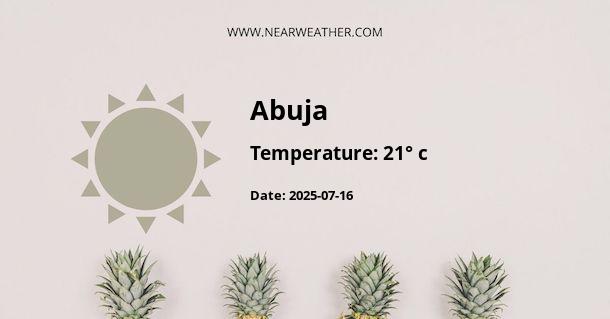Abuja Weather Today
Daily Weather Forecast & Temperature in Abuja
Sun & Moon
Location Info
Embed This Weather
Climate and Weather in Abuja, Nigeria
Abuja, the capital city of Nigeria, is known for its unique climate and weather patterns. Located in the central part of the country, Abuja experiences a tropical savanna climate, characterized by distinct wet and dry seasons throughout the year. Understanding the climate and weather in Abuja is essential for both residents and visitors to plan their activities and make necessary preparations.
Temperature
The average annual temperature in Abuja ranges from 24°C (75°F) to 31°C (88°F). The city experiences relatively high temperatures year-round due to its location near the equator. The hottest months are typically between November and March, with temperatures often reaching above 35°C (95°F). During the cooler months of December and January, temperatures can drop to around 16°C (61°F) in the mornings and evenings.
The table below provides an overview of the average monthly temperatures in Abuja:
| Month | Average Temperature (°C) |
|---|---|
| January | 25 |
| February | 26 |
| March | 27 |
| April | 27 |
| May | 27 |
| June | 26 |
| July | 25 |
| August | 25 |
| September | 24 |
| October | 25 |
| November | 26 |
| December | 25 |
Rainfall
Abuja has a distinct wet and dry season. The wet season typically lasts from April to October, while the dry season spans from November to March. The heaviest rainfall occurs between June and September, with August being the wettest month. During this period, Abuja receives an average of 1,600mm (63 inches) of rainfall.
On the other hand, the dry season is characterized by lower humidity levels and significantly less rainfall. December and January are the driest months, receiving only a few millimeters of rainfall. The table below illustrates the average monthly rainfall in Abuja:
| Month | Average Rainfall (mm) |
|---|---|
| January | 0 |
| February | 2 |
| March | 10 |
| April | 82 |
| May | 124 |
| June | 194 |
| July | 233 |
| August | 230 |
| September | 189 |
| October | 47 |
| November | 3 |
| December | 0 |
Harmattan Season
Abuja experiences the influence of the Harmattan season, which occurs between December and February. The Harmattan is a dry and dusty wind that blows from the Sahara Desert across West Africa. During this period, visibility may be reduced due to the dust particles in the air, and the humidity levels are lower compared to other months.
Recommended Clothing
Given the climate and weather patterns in Abuja, it is advisable to dress comfortably and appropriately for the prevailing conditions. Light and breathable clothing is recommended for the hot and humid months, while warmer clothing is necessary during the cooler mornings and evenings. It is also advisable to carry a hat, sunglasses, and sunscreen to protect against the strong sun.
Conclusion
Abuja's climate is characterized by high temperatures, distinct wet and dry seasons, and the influence of the Harmattan wind. Understanding the weather patterns in Abuja allows residents and visitors to plan their activities accordingly and make necessary preparations. Whether enjoying the city's outdoor attractions or conducting business, being aware of the local climate helps ensure a pleasant and comfortable experience in Nigeria's capital city.
What is the Latitude and Longitude of Abuja?
Abuja's Latitude is 9.057350 & Longitude is 7.489760.
What is the weather in Abuja today?
Weather in Abuja is 30° today.
What is the climatic condition of Abuja today?
Climate Conditions in Abuja shows few clouds today.
What is the humidity in Abuja today?
Humidity in Abuja is 31% today.
What is the wind speed in Abuja today?
Wind speed in Abuja is 7.88 km/h, flowing at 28° NNE wind direction.
What does it feel like in Abuja today?
It feels like 29° in Abuja today, with 18% cloud cover and 10 km visibility.
